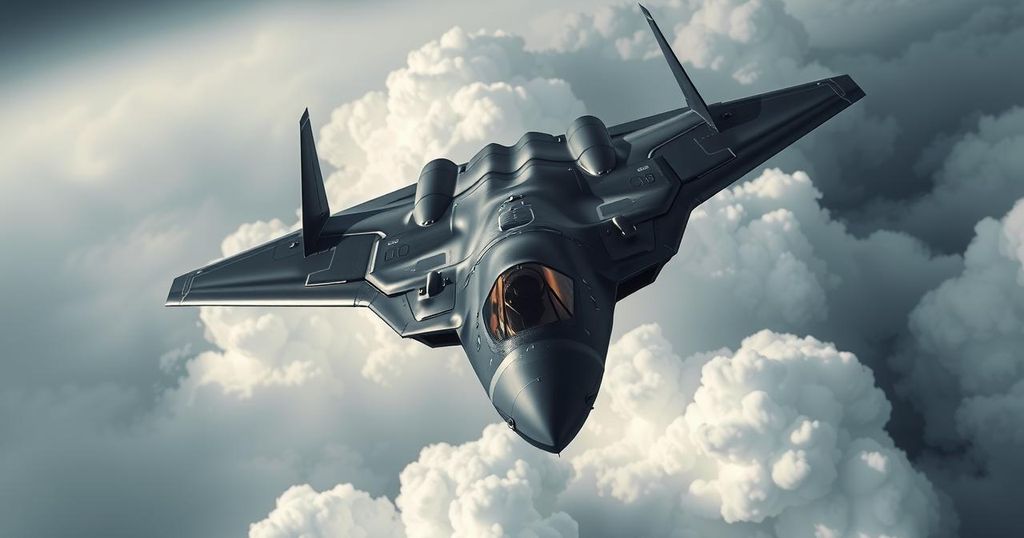US Stealth Bombers Essential for Israel’s Potential Operation Against Iran’s Nuclear Sites
Israel may require US military support to successfully neutralize Iran’s underground nuclear facilities. This operation would involve extensive strikes utilizing advanced weaponry, particularly the Northrop B-2 Spirit stealth bomber. Former President Trump has indicated a preference for negotiations, though military action remains a viable option. The intricacies of this military scenario could mark a significant shift in warfare strategies.
Israel faces a critical need for United States assistance should it launch a military operation aimed at dismantling Iran’s underground nuclear infrastructure. Such an operation would necessitate numerous cruise missile strikes and heavy bunker-busting munitions. Analysts suggest that a short air campaign by the US and Israel would have limited effectiveness against Iran’s rapidly advancing nuclear program, capable of enriching uranium sufficient for a nuclear weapon within weeks.
Former President Donald Trump has emphasized the importance of negotiating a nuclear deal with Iran, referencing a potential situation that might unfold imminently. Following recent US military actions against Iran-backed Houthi rebels in Yemen, Trump reiterated the use of military force as an option while expressing a preference for diplomatic negotiations. Early indications surrounding a fresh deal with Iran seem unfavorable amidst escalating rhetoric.
Israel may consider pre-emptive strikes, yet such actions will require extensive air support from the US, particularly to target significant underground facilities housing weapons-grade uranium. Senior military analysts indicate that to effectively neutralize Iran’s nuclear capabilities, Israel and the US would have to engage in repeated strikes utilizing advanced weaponry, including the Northrop B-2 Spirit stealth bomber, which is uniquely capable of deploying massive bunker-buster bombs.
Military experts have outlined that a joint strike between Israeli and US forces against Iran could yield insights into the operational capacities of US-made military systems, which could be relevant against other global powers. Concurrently, the United Nations Security Council is monitoring Iran’s uranium enrichment activities, as the US condemns Tehran’s breach of international agreements.
Israel’s air force possesses advanced fighter jets but lacks heavy bombers equipped to transport large bunkering munitions necessary for a successful strike against Iran’s fortified nuclear sites. The Natanz and Fordow enrichment facilities remain primary targets, where satellite imagery indicates extensive protective measures have been implemented by Iran to prevent damage.
Any military intervention would necessitate a comprehensive strategy, targeting not only Iran’s nuclear sites but also its air defenses and missile systems utilizing a combination of aerial and naval weaponry, cyberattacks, and possibly special operations. Previous Israeli strikes have demonstrated their capacity to weaken Iranian defenses, though assessing the potential repercussions remains crucial.
Despite Iran’s outdated military forces being measurably inferior to US and Israeli capabilities, the overall effectiveness of a military strike remains contingent on a range of factors. Should the US-Israeli campaign fail to comprehensively address Iran’s military capabilities, Tehran could initiate retaliation through its extensive stockpile of ballistic missiles.
With Iran having bolstered its defenses over decades, any strikes may not wholly eradicate the nation’s nuclear ambitions. Experts anticipate that Iran might endure and recover even after a concerted military assault. A joint operation against Iran’s nuclear program could mark a pivotal moment in warfare, representing a technologically advanced and extensive military engagement between two allied nations.
The necessity for US stealth bombers in potential Israeli operations against Iran underscores the complexity of addressing Iran’s nuclear capabilities. A combined military strategy involving advanced weaponry and extensive planning would be essential for effectiveness, given Iran’s fortified defenses and rapid nuclear enrichment capabilities. The geopolitical implications of such actions require careful consideration of past engagements and Iran’s potential military responses.
Original Source: www.businessinsider.com




Post Comment